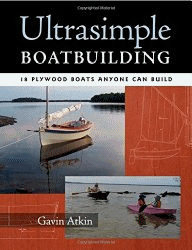Wednesday, February 12, 2014
Browse »
home»
Hull Painting
 Spent quite a while sanding and filling and fairing the lead keel into the hull. Spent a whole day dusting and vacuuming the shop to eliminate as mush dust as possible. Then I hung a polythene tent over the hull to prevent any further dust from landing on it.
Spent quite a while sanding and filling and fairing the lead keel into the hull. Spent a whole day dusting and vacuuming the shop to eliminate as mush dust as possible. Then I hung a polythene tent over the hull to prevent any further dust from landing on it.
I heated up the hull by using an infrared panel underneath the hull. Then tack ragged the hull. Afterwards, I applied two different types of primer - one which is specified for under water which looks like silver paint and the other primer an aluminium primer for the top sides.
 I applied 3 coats of primer and lightly sanded in between.
I applied 3 coats of primer and lightly sanded in between.
Next I applied a top coat of Hempels Brilliant Enamel. The first coat went on very watery - I had thinned it about 10%. It ran and sagged and looked awful! So I lightly sanded it back and applied a second coat un-thinned this time. It dried to a nice shinny colour, but the finish was poor - t looked like leather! So I called the Hempel technical department who suggested my paint was probably stored too cold before use. They suggested I store the paint in the house to bring it slowly up to room temperature and not to thin it during application. I have been using high quality brushes, so it's a bit disappointing getting such a poor finish.
 With Brian's help, I have since sanded down the second coat to a flat uniform finish and am pondering how to apply the top coat. I'm thinking that I have too much a differential in temperature between the hull (about 15degC) (which is heated from underneath) and the ambient temperature 10degC and the paint which was probably a few degrees lower again.
With Brian's help, I have since sanded down the second coat to a flat uniform finish and am pondering how to apply the top coat. I'm thinking that I have too much a differential in temperature between the hull (about 15degC) (which is heated from underneath) and the ambient temperature 10degC and the paint which was probably a few degrees lower again.
More trial & horror!
In between, I steamed some ash again to make a new tiller - the first version was unsatisfactory. I found I had a lot of spring back because the wood had probably cooled too much before I had it bent onto the formers. So I re-steamed it, and to my surprise it straightened out completely and then bent much more easily onto the former. I haven't yet unclamped it, but I'm hopeful for a better result.

Hull Painting
I heated up the hull by using an infrared panel underneath the hull. Then tack ragged the hull. Afterwards, I applied two different types of primer - one which is specified for under water which looks like silver paint and the other primer an aluminium primer for the top sides.
 I applied 3 coats of primer and lightly sanded in between.
I applied 3 coats of primer and lightly sanded in between. Next I applied a top coat of Hempels Brilliant Enamel. The first coat went on very watery - I had thinned it about 10%. It ran and sagged and looked awful! So I lightly sanded it back and applied a second coat un-thinned this time. It dried to a nice shinny colour, but the finish was poor - t looked like leather! So I called the Hempel technical department who suggested my paint was probably stored too cold before use. They suggested I store the paint in the house to bring it slowly up to room temperature and not to thin it during application. I have been using high quality brushes, so it's a bit disappointing getting such a poor finish.
 With Brian's help, I have since sanded down the second coat to a flat uniform finish and am pondering how to apply the top coat. I'm thinking that I have too much a differential in temperature between the hull (about 15degC) (which is heated from underneath) and the ambient temperature 10degC and the paint which was probably a few degrees lower again.
With Brian's help, I have since sanded down the second coat to a flat uniform finish and am pondering how to apply the top coat. I'm thinking that I have too much a differential in temperature between the hull (about 15degC) (which is heated from underneath) and the ambient temperature 10degC and the paint which was probably a few degrees lower again.More trial & horror!
In between, I steamed some ash again to make a new tiller - the first version was unsatisfactory. I found I had a lot of spring back because the wood had probably cooled too much before I had it bent onto the formers. So I re-steamed it, and to my surprise it straightened out completely and then bent much more easily onto the former. I haven't yet unclamped it, but I'm hopeful for a better result.

Subscribe to:
Post Comments (Atom)


No comments:
Post a Comment